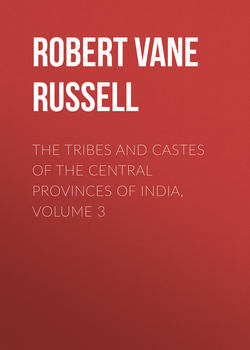Читать книгу The Tribes and Castes of the Central Provinces of India, Volume 3 - Robert Vane Russell - Страница 91
Gond
(g) Appearance and Character, and Social Rules and Customs
73. The caste panchāyat and social offences
ОглавлениеThe tribe have panchāyats or committees for the settlement of tribal disputes and offences. A member of the panchāyat is selected by general consent, and holds office during good behaviour. The office is not hereditary, and generally there does not seem to be a recognised head of the panchāyat. In Mandla there is a separate panchāyat for each village, and every Gond male adult belongs to it, and all have to be summoned to a meeting. When they assemble five leading elderly men decide the matter in dispute, as representing the assembly. Caste offences are of the usual Hindu type with some variations. Adultery, taking another man’s wife or daughter, getting vermin in a wound, being sent to jail and eating the jail food, or even having handcuffs put on, a woman getting her ear torn, and eating or even smoking with a man of very low caste, are the ordinary offences. Others are being beaten by a shoe, dealing in the hides of cattle or keeping donkeys, removing the corpse of a dead horse or donkey, being touched by a sweeper, cooking in the earthen pots of any impure caste, a woman entering the kitchen during her monthly impurity, and taking to wife the widow of a younger brother, but not of course of an elder brother.
In the case of septs which revere a totem animal or plant, any act committed in connection with that animal or plant by a member of the sept is an offence within the cognisance of the panchāyat. Thus in Mandla the Kumhra sept revere the goat and the Markām sept the crocodile and crab. If a member of one of these septs touches, keeps, kills or eats the animal which his sept reveres, he is put out of caste and comes before the panchāyat. In practice the offences with which the panchāyat most frequently deals are the taking of another man’s wife or the kidnapping of a daughter for marriage, this last usually occurring between relatives. Both these offences can also be brought before the regular courts, but it is usually only when the aggrieved person cannot get satisfaction from the panchāyat, or when the offender refuses to abide by its decision, that the case goes to court. If a Gond loses his wife he will in the ordinary course compromise the matter if the man who takes her will repay his wedding expenses; this is a very serious business for him, as his wedding is the principal expense of a man’s life, and it is probable that he may not be able to afford to buy another girl and pay for her wedding. If he cannot get his wedding expenses back through the panchāyat he files a complaint of adultery under the Penal Code, in the hope of being repaid through a fine inflicted on the offender, and it is perfectly right and just that this should be done. When a girl is kidnapped for marriage, her family can usually be induced to recognise the affair if they receive the price they could have got for the girl in an ordinary marriage, and perhaps a little more, as a solace to their outraged feelings.
The panchāyat takes no cognisance of theft, cheating, forgery, perjury, causing hurt and other forms of crime. These are not considered to be offences against the caste, and no penalty is inflicted for them. Only if a man is arrested and handcuffed, or if he is sent to jail for any such crime, he is put out of caste for eating the jail food and subjected in this latter case to a somewhat severe penalty. It is not clear whether a Gond is put out of caste for murder, though Hindu panchāyats take cognisance of this offence.
